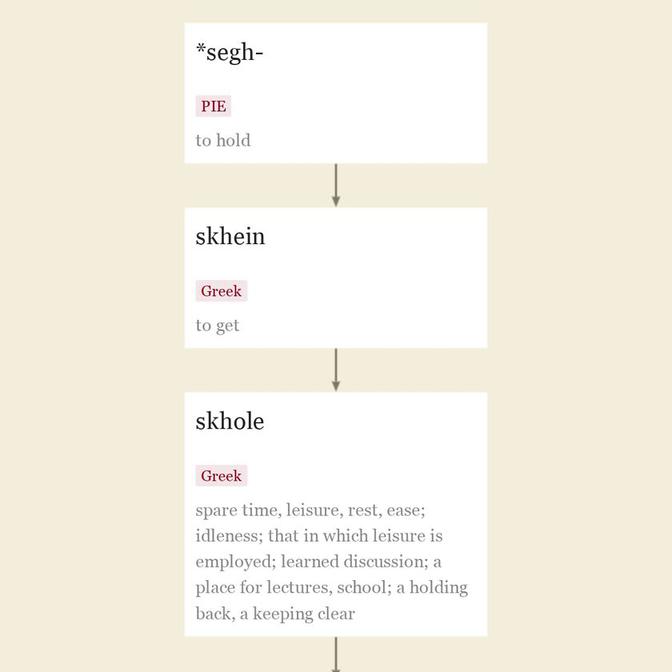schoolmarm (n.)
also school-marm, "female school teacher," 1834, American English colloquial, in the popular countrified humor writing of "Major Jack Downing" of Maine (Seba Smith); a variant of school-ma'am (1828), from school (n.1) + ma'am. See R. Used figuratively from 1887 in reference to patronizing and priggish instruction.
School-mistress "woman who teaches in a school" is attested from c. 1500 (mid-14c. as a surname, scole-maistres). School-dame (1650s) was generally "an old woman who keeps a school for small children."
Entries linking to schoolmarm
eighteenth letter of the English alphabet, traceable to Phoenician and always representing more or less the same sound, which in many languages is typically so resonant and continuous as to be nearly akin to the vowels, but in English is closer to -l-.
It was aspirated at the start of words (hr-) in Old English, as in Greek, but this was abandoned in English spelling and pronunciation by the end of the Old English period, but the rh- spelling survives in many words borrowed from Greek. In many languages and some dialects (e.g. Scottish) it is pronounced with a distinct trilling vibration of the tongue-tip, which gave it its ancient nickname of "the dog letter;" in other regional dialects (e.g. Boston) it is omitted unless followed by a vowel, while in others it is introduced artificially in pronunciation ("idear," "drawring," tomorrer for tomorrow is attested in print by 1901).
If all our r's that are written are pronounced, the sound is more common than any other in English utterance (over seven per cent.); the instances of occurrence before a vowel, and so of universal pronunciation, are only half as frequent. There are localities where the normal vibration of the tip of the tongue is replaced by one of the uvula, making a guttural trill, which is still more entitled to the name of "dog's letter" than is the ordinary r; such are considerable parts of France and Germany; the sound appears to occur only sporadically in English pronunciation. [Century Dictionary]
Louise Pound ("The Humorous 'R'") notes that in British humorous writing, -ar- "popularly indicates the sound of the vowel in father" and formations like larf (for laugh) "are to be read with the broad vowel but no uttered r."
The moment we encounter the added r's of purp or dorg in our reading we know that we have to do with humor, and so with school-marm. The added consonants are supposed to be spoken, if the words are uttered, but, as a matter of fact, they are less often uttered than seen. The words are, indeed, largely visual forms; the humor is chiefly for the eye. [Louise Pound, "The Humorous 'R,'" American Mercury, October 1924]
She also quotes Henry James on the characteristic prominence of the medial -r- sound (which tends to be dropped in England and New England) in the speech of the U.S. Midwest, "under some strange impulse received toward consonantal recovery of balance, making it present even in words from which it is absent, bringing it in everywhere as with the small vulgar effect of a sort of morose grinding of the back teeth."
In a circle, meaning "registered (trademark)," attested by 1925. R&R "rest and relaxation," is attested by 1953, American English; R&B "rhythm and blues" (type of popular music) is attested by 1949, American English. Form three Rs, see Three Rs.
[place of instruction] Middle English scole, from Old English scol, "institution for instruction," from Latin schola "meeting place for teachers and students, place of instruction;" also "learned conversation, debate; lecture; disciples of a teacher, body of followers, sect," also in the older Greek sense of "intermission of work, leisure for learning."
This is from Greek skholē "spare time, leisure, rest, ease; idleness; that in which leisure is employed; learned discussion;" also "a place for lectures, school;" originally "a holding back, a keeping clear," from skhein "to get" (from PIE root *segh- "to hold") + -olē by analogy with bolē "a throw," stolē "outfit," etc.
The basic sense of the Greek word is "leisure," which passed to "otiose discussion" (in Athens or Rome, the favorite or proper use of free time), then it came to be used for the place for such discussion.
The Latin word was widely borrowed (in addition to Old French escole, French école, Spanish escuela, Italian scuola; Old High German scuola, German Schule, Swedish skola, Gaelic sgiol, Welsh ysgol, Russian shkola).
The meaning "students attending a school" in English is attested from c. 1300; the sense of "school building" is by 1590s. Sense of "people united by a general similarity of principles and methods" is from 1610s; hence school of thought (by 1848). As an adjective by mid-18c., "pertaining to or relating to a school or to education."
School of hard knocks "rough experience in life" is by 1870; to tell tales out of school "betray damaging secrets" is from 1540s. School-bus is from 1908. School days is from 1590s. School board "local committee of education" is by 1836; school district "division of a town or city for the management of schools" is by 1809.
Trends of schoolmarm
More to Explore
updated on February 01, 2022
Dictionary entries near schoolmarm
schoolboy
schooled
schoolgirl
school-house
schooling
schoolmarm
school-master
schoolmate
schoolroom
school-teacher
schooner

